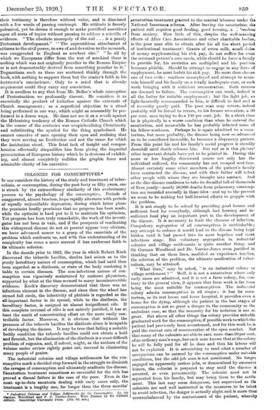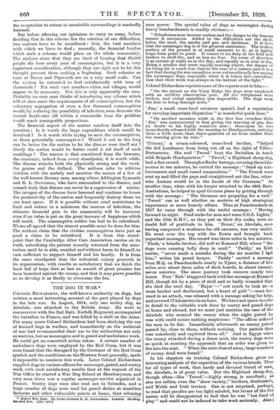COLONIES FOR CONSUMPTIVES.* Iv one considers the history of the
study and treatment of tuber- culosis, or consumption, during the past forty or fifty years, one is struck by the extraordinary similarity of this evolutionary process to the psychology of the consumptive. Periods of exaggerated, almost baseless, hope rapidly alternate with periods of equally unjustifiable depression, during which latter phase the pessimist loudly proclaims that no progress has been made, while the optimist is hard put to it to maintain his optimism. Yet progress has been truly remarkable, the work of the investi- gator has not been in vain, and if the prospects of eradicating this widespread disease do not at present appear very obvious, we have advanced nearer to a grasp of the essentials of the problem which confronts us, and with this understanding of its complexity has come a more assured if lees exuberant faith in its ultimate solution.
In the decade prior to 1882, the year in which Robert Koch discovered the tubercle bacillus, doubts had arisen as to the purely hereditary nature of consumption, which had until then been regarded as a diathesis, or state of the body rendering it liable to certain diseases. The non-infectious nature of con- sumption was vigorously maintained by eminent physicians, supported by what at the time seemed to many incontrovertible evidence. Koch'a discovery demonstrated that there was an Infectious element in the disease, and since then the wheel has turned full circle, the infectivity of phthisis is regarded as the all-important factor in its spread, while to the diathesis, the hereditary factor, is assigned an almost insignificant role. If this complete reversal of roles is not entirely justified, it has at least the merit of concentrating effort on the more easily con- trollable factor. Moreover, it is obvious that without the presence of the tubercle bacillus the diathesis alone is incapable of developing the disease. It may be true that failing a suitable bodily condition the tubercle bacillus could not obtain a hold and flourish, but the elimination of the diathesis is a most difficult problem of eugenics, and, if solved, might, as the authors of the volume under review rightly point out, succeed in eliminating many people of genius.
The industrial colonies and village settlements for the con- sumptive mark a decided step forward in the struggle to diminish the ravages of consumption and ultimately eradicate the disease. Sanatorium treatment sometimes so successful for the rich has proved a dismal failure in the case of the poor. Even in the most up-to-date sanatoria dealing with early cases only, the treatment is a lengthy one, fax longer than the three months'
• Industrial Colonies and Village Settlements for the Consumptive. By Sir German Woodhead and P. C. Verrier-Jones. With Preface by Sir Clifford Alibutt. Cambridge University Prias. 110s. dd. neLl
sanatorium treatment granted to the manual labourer under the National Insurance scheme. After leaving the sanatorium the patient still requires good feeding, good housing, a 'reedom
from anxiety. How little of this, despite the well-meaning efforts of After Care Associations and other charitable bodies, is the poor man able to obtain after Ida all too short period. of institutional treatment ! Grants of extra milk, small doles of money supplementing his sick pay, do not suffice for even the returned patient's own needs, while should he have a family to provide for, his anxieties are multiplied and his position becomes pitiable. Should he attempt to engage in any form of employment, he must forfeit his sick pay. Ho must then choose one of two evils : continue unemployed and attempt to main- tain himself and his family on a totally inadequate sum, or sock work bringing with it sufficient remuneration. Both courses are doomed to failure. The consumptive can work, indeed is all the better for suitable employment ; but the light job, so light-heartedly recommended to him, is difficult to find and is of necessity poorly paid. The poor man may return, indeed probably will be forced to return, to his former avocation, a 50 per cent. man trying to do a 100 per cent. job. In a short time he is physically in a worse condition than when he entered the sanatorium, and meanwhile he has probably infected some of his fellow-workmen. Perhaps ho is again admitted to a sana- torium, but more probably, the disease being now so advanced as to be considered incurable, ho becomes a dispensary patient. From this point his and his family's social progress is steadily downhill until death releases hint But sad as is this picture' other important details have yet to be painted in. During this more or less lengthy downward course not only has the individual suffered, the community has not escaped scot-free. Almost certainly some other members of the patient's family have contracted the disease, and with their father will infect other people with whom they arc brought into contact. And so the dire disease continues to take its dreadful toll of thousands of lives yearly—nearly 50,000 deaths from pulmonary consump- tion are recorded annually in these isles—and up to the present we seem to be making but half-hearted efforts to grapple with the problem.
It is not simply to be solved by providing good houses and sufficient food for everybody, although bad housing and in- sufficient food play an important part in the development of the disease. It is necessary to limit the chances of infection. Compulsory segregation of all consumptives is unthinkable; any attempt to enforce it would lead to the disease being kept hidden until it had passed into its moat hopeless and most infectious stage. But voluntary segregation in industrial colonies and village settlements is quite another thing, and Sir German Woodhead and Dr. Varrier-Jones seem justified in thinking that on these lines, modified as experience teaches, the solution of the problem, the ultimate eradication of tuber- culosis, may be attained.
" What then," may be asked, " is an industrial colony or village settlement " Well, it is not a sanatorium where only early cases are admitted, and it is not a farm colony, for, con- trary to the general view, it appears that farm work is far from being the most suitable for consumptives. The industrial colony admits consumptives in all stages ; it has its sana- torium, or its rest house and fever hospital, it provides even a home for the dying, although the patient in the last stages of consumption is not so great a danger to the community as the ambulant case, so that the necessity for his isolation is not so great. But above all other things the colony provides suitable graduated work for the consumptive, if possible work to which the patient had previously been accustomed, and for this work he is paid the current rate of remuneration of the open market. Not that many of the colonists are able to earn more than 50 per cent. of an ordinary man's wage, but each man knows that at the colony be will be fully paid for all he does and that his labour will not be exploited. It is astonishing to read what a number of occupations can be entered by the consumptive under suitable conditions, but the odd-job man is not mentioned. No longer engaged on apparently useless jobs, or demoralized by excessive leisure, the colonist is prepared to stay until the disease ie arrested, or even permanently. The colonist need not b4 separated from his family, but may bring them to the settle meat. This last may seem dangerous, but supervised as the colonists are and well instructed in the measures to be take* to avoid infection, the danger is actually slight and is more than counterbalanced by the contentment of the patient, whereby
the temptation to return to unsuitable surroundings is markedly lessened.
But before allowing our optimism to carry us away, before deciding that hi this scheme lies the solution of our difficulties, two matters have to be considered : first, the vast numbers with which we have to deal ; secondly, the financial burden which such a scheme would place on the whole community, The authors state that they are tired of hearing that 60,000 people die here every year of consumption, but it is a very important consideration, although they are right not to let this thought prevent them making a beginning. Such colonies as exist at Bourn and Papworth are on a very small scale. Can the system be extended to deal satisfactorily with tens of thousands ? For such vast numbers cities, not villages, would appear to be necessary. But this is only apparently the case. Probably no sane man thinks of introducing any scheme which will at once meet the requirements of all consumptives, but the voluntary segregation of even a few thousand consumptives would, by reducing the possibility of infection, soon decrease the annual death-rate till within a reasonable time the problem would reach manageable proportions.
The financial aspect of the matter resolves itself into the question : Is it worth the large expenditure which would be involved ? Is it worth while trying to save the consumptives, or those potentially consumptive ? Would it not in the long run be better for the nation to let the disease wear itself out ? Surely the nation would be better could it rid itself of such weaklings ? The answer is that considered from the humane, the economic, indeed from every standpoint, it is worth while. The disease attacks both the physically strong and the weak the genius and the dullard. The authors refer to athletes stricken with the malady and mention the names of a few of the well-known literary men, among others Addington Symonds and R. L. Stevenson, who have succumbed to the disease, and remark truly that disease can never be a regenerator of nation. The ravages of the disease have lessened and continue to lessen the productivity of tho nation and frequently destroy those we can least spare. If it is possible without cruel restrictions to limit and reduce to a minimum the sources of infection, the ultimate financial gain to the community will be immense even if no value is put on the great increase of happiness which will result. The consumptive soldier has had to be subsidized. We are all agreed that the utmost possible must be done for him. The authors claim that the civilian consumptives have just as good a claim to be subsidized. It is from this stand- point that the Cambridge After Care Association carries on its work, subsidizing the patient recently returned from the sana- torium until he is able, unaided and without harm to himself, to earn sufficient to support himself and his family. It is from the same standpoint that the industrial colony proceeds in its organization, with results so satisfactory that we finish the book full of hope that at last an assault of groat promise has been launched against the enemy, and that it may prove possible so to develop it as finally to overcome the foe.



































 Previous page
Previous page